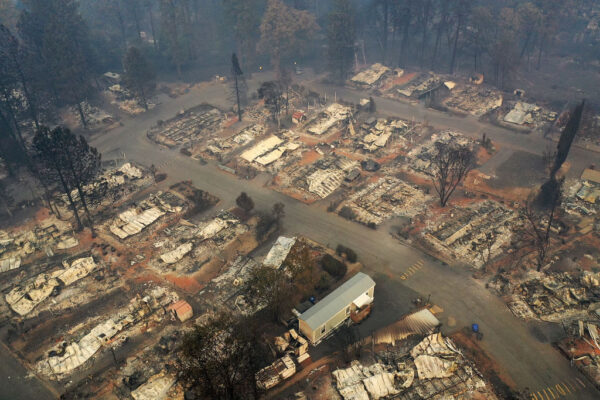Unearthed today: Threat multipliers

“Wildfires in California have burned a record 4 million acres since the start of 2020, charring more land in the past nine months than during the previous three years combined,” Bloomberg reports.
Well aren’t you glad you decided to read this note on a Monday morning? I’m sorry, I don’t make the news happen, I just report on it, at least it’s not about Trump and the pandemic… or is it?
“We’re used to thinking about mass incarceration or climate change or public health or reproductive rights or immigration as singular issues,” writes Mary Annaïse Heglar in the Rolling Stone.
This was always a cognitive luxory, and one Heglar points out was never available to Black people; “When your life is a constant, orchestrated crisis, you can’t afford not to see how disease, discrimination, disenfranchisement, and disinvestment converge to create symptoms like higher rates of under- and unemployment and homelessness and incarceration and over-policing.”
Now climate-change has announced itself as the threat multiplier it was always likely to be – and in so doing broken down the barriers some of us like to put up in our minds.
“That’s how you get an unprecedented wildfire season with a shortage of firefighters because so many of the prison firefighters we’d come to rely on have fallen victim to the pandemic because of prison conditions. And it’s how you get migrant detainees suffering in unbearable heat with no water or power in the wake of a Category 4 hurricane, or white nationalist militias setting up checkpoints in the midst of wildfire-induced chaos. Everywhere you look there’s some calamity wrapped in a tragedy inside an injustice — like nesting dolls.”
This does not make writing a niche environmental and climate news round-up easy.
Over on Reuters is a report that supermarkets and food companies in the UK are taking the government to task for a loophole in new rules designed to prevent them from causing deforestation – with the impacts it has not just on the environment but on indigenous communities who live in those regions.
The rules mean the firms are meant to avoid sourcing products from regions where illegal deforestation takes place – but this ignores the vast amount of deforestation which is, at least on paper, legal – such as happens in Brazil’s Cerrado.
But it’s hard to decipher what’s happening here? Are companies trying to get the UK government to – effectively – start a mini-trade war with Brazil and Indonesia over the environment and human rights?
Or are they mostly trying to pass the buck, knowing that – with Brexit and, y’ know, the general state of things – the UK government is unlikely to tack in that direction anytime soon?
Three things you need to know
Farmers call on UK to commit in law to ban chlorinated chicken: Government must ‘put down a red line’ in the agriculture bill, says NFU president
York plans to build Britain’s biggest zero-carbon housing project: “Passivhaus is like base camp when you’re trying to climb the Everest of zero carbon,” says architect David Mikhail. “We’re planning to go above and beyond, taking into account much more than just the efficient fabric of the houses.”
BlackRock criticised over drop in climate votes: BlackRock backed fewer environmental votes at annual meetings this year than last, despite chief executive Larry Fink’s warning in January that climate change represented a risk to markets unlike any previous crisis.

